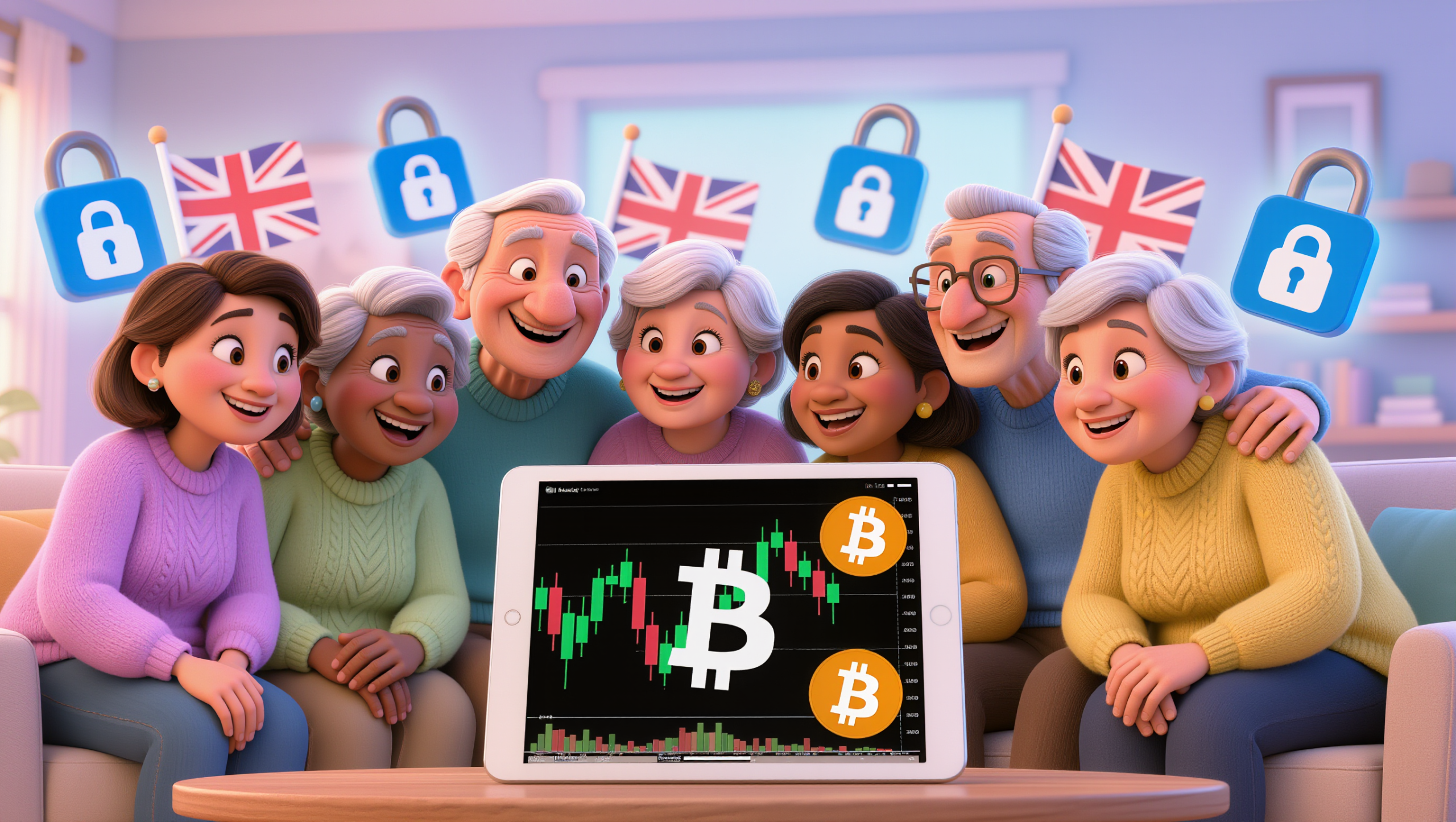You know what I find interesting? The same people who tell me Bitcoin is “too risky” often have their life savings in a single bank, invested in stocks they don’t understand, or sitting in cash that loses value every year to inflation. So let me ask you this: what does “safe” actually mean?
Good morning, folks. Walter here, and today we’re tackling the question I hear most often from people our age: “Is Bitcoin safe for beginners over 50?”
The short answer? It depends entirely on what you mean by “safe.”
The longer answer? Well, that’s what we’re here to discuss. Grab a cup of tea, settle in, and let’s talk about safety in a way that actually makes sense for those of us who remember when “computer security” meant locking the door to the computer room.
The Day Margaret Lost Her Mind Over Bitcoin
Let me tell you about my Margaret. She’s 67, sensible as they come, and has managed her finances prudently for decades. Last year, she decided to put £500 into Bitcoin. I watched her go through the most extraordinary transformation, one that perfectly illustrates everything you need to know about Bitcoin “safety.”
Week one: “Walter, this is fascinating! I’m up £50 already!”
Week three: “Good Lord, I’ve lost £200. Is this normal?”
Week six: “I’m back to even, but I nearly had a heart attack watching it bounce around.”
Month three: “You know what? I’ve stopped checking the price daily. It’s educational money now.”
Margaret’s journey perfectly captures what Bitcoin safety really means. The technology didn’t fail her, the security held up fine, and she didn’t lose money to scams. But she learned something crucial: Bitcoin’s biggest risk isn’t hackers or fraud, it’s the rollercoaster ride your emotions take every single day.
Bitcoin Price Volatility Chart – November 6-15, 2025
| Date | Price (USD) | Daily % Change | Notable Event |
|---|---|---|---|
| Nov 6, 2025 | $103,878 | +2.5% | Strong mid-week rally |
| Nov 7, 2025 | $101,323 | -2.5% | Sharp reversal day |
| Nov 8, 2025 | $103,396 | +2.0% | Recovery bounce |
| Nov 11, 2025 | $103,047 | -0.3% | Sideways action |
| Nov 12, 2025 | $101,658 | -1.3% | Continued weakness |
| Nov 13, 2025 | $99,729 | -1.9% | Testing $100K support |
| Nov 14, 2025 | $94,398 | -5.3% | Major crash day |
| Nov 15, 2025 | $96,197 | +1.9% | Partial recovery |
This is the type of volatility you can expect. This is just the last 2 weeks! Look at November 14th – Bitcoin dropped over 5% in a single day, falling from nearly $100,000 to $94,398. That’s like watching $5,602 disappear from every Bitcoin you own while you’re having your morning coffee. Then, just to keep things interesting, it bounced back nearly 2% the next day.
This two-week period alone shows a 10% swing from high to low. In traditional investing, if your stock portfolio moved 10% in two weeks, you’d be calling your broker. In Bitcoin, that’s just another fortnight.
What “Safe” Actually Means (And Why Banks Might Not Be As Safe As You Think)
When you ask if Bitcoin is safe, you’re actually asking several different questions at once. Let me separate them out, because each has a different answer.
Is the Technology Safe?
Here’s something that might surprise you: Bitcoin’s underlying blockchain technology has never been hacked in its 16-year history. Never. Not once. That’s a better security record than most banks can claim.
But here’s the catch, and it’s a big one: whether your Bitcoin is safe depends entirely on how you store it. Remember when we used to carry chequebooks? The banking system was secure, but if you left your chequebook in your unlocked car with a pen attached, someone could clean out your account. The bank didn’t fail, you just didn’t protect your access properly.
Bitcoin works exactly the same way. The network is bulletproof, but if you write your password on a sticky note and leave it on your monitor, well, that’s not Bitcoin’s fault.
Is Your Money Safe from Vanishing?
Now we get to the uncomfortable truth. Bitcoin’s price swings are not for the faint of heart. Let me paint you a picture from my own observations:
I watched a friend’s Bitcoin investment go from £1,000 to £3,000 during 2020, then crash to £800 in 2022, then climb back to £2,400 by 2024. That same friend told me it was like “riding a particularly aggressive rollercoaster while wearing a blindfold and having someone randomly throw money at you or take it away.”
Compare that to your ISA, which might earn 2-3% annually but doesn’t make you question your sanity before breakfast. Bitcoin can drop 10% before you’ve finished your morning tea and rise 15% by dinner.
Margaret, the friend I mentioned earlier, put this beautifully: “Walter, I realised I was treating it like entertainment money. The moment I stopped expecting it to behave like my savings account, I could actually enjoy the ride.”
The Scam Minefield (And How Not to Step on the Explosive Ones)
Here’s where I need to be brutally honest: the crypto space is absolutely riddled with scams. We’re talking about an industry where people have lost billions to frauds that would make even Bernie Madoff blush.
But here’s the good news: most scams are obvious if you know what to look for. And frankly, you’ve got an advantage here. Remember those emails claiming you’d won the Spanish lottery? The ones asking for your bank details to “release your inheritance”? You probably spotted those as rubbish immediately.
The same pattern-recognition skills apply to crypto scams. If someone cold-calls you about Bitcoin, it’s a scam. If someone guarantees returns, it’s a scam. If someone pressures you to invest quickly because of a “limited time offer,” it’s definitely a scam.
I’ve seen people fall for “SafeMoonElonDogeRocket” (yes, that’s a real cryptocurrency name), but I’ve yet to meet anyone over 50 who got taken in by that nonsense. Your natural scepticism is actually a superpower in this space.
The UK Reality Check: What Protection Do You Actually Have?
Let’s talk about what’s different in the UK compared to other countries, because it matters.
The Financial Conduct Authority regulates crypto firms here, but their protection is limited. Your Bitcoin isn’t covered by the Financial Services Compensation Scheme like your bank deposits are. If you lose your Bitcoin, there’s no government safety net to catch you.
But here’s what you do get: any firm operating in the UK must be FCA-registered. That provides some protection, though nothing like traditional banking.
More importantly, there’s the tax situation that nobody talks about. HMRC considers Bitcoin an asset, not currency. This means you owe capital gains tax when you sell Bitcoin for profit. The annual allowance is now just £3,000, down from £12,000 previously.
I know someone who made modest profits trading various cryptocurrencies, only to discover he owed several thousand pounds in tax he hadn’t set aside. That’s a safety issue of a different sort, but equally important.
David’s £30 Lesson (The Best Investment He Ever Made)
Let me tell you about David’s approach. He started with £30 worth of Bitcoin, just to understand how it worked. He accidentally sent it to the wrong type of address and lost it all.
“Best £30 I ever spent on education,” he said. “Now I know exactly what not to do when I buy more.”
That’s the approach I recommend. Start absurdly small. £20, £30, £50 maximum. Treat it as your tuition fee for understanding this technology. You’ll learn the processes without meaningful financial risk, and you’ll make your inevitable beginners’ mistakes when they cost pounds, not hundreds of pounds.
The Age Advantage (Why Being Over 50 Is Actually Perfect for This)
Here’s something the young crypto enthusiasts won’t tell you: your age and experience are protective factors.
You’ve seen the dot-com bubble, the 2008 crash, and multiple market manias. You know that get-rich-quick rarely works. You’re less likely to chase ridiculous trends or make emotional investment decisions.
Consider two different approaches: a 28-year-old investor put his entire savings into something called ‘SafeMoon’ because it was trending on social media. He lost 90% in three months. Meanwhile, a 62-year-old investor put 2% of his portfolio into Bitcoin after six months of research and has done quite well.
The difference? The 62 year old treated it like any other investment decision, with research, patience, and appropriate position sizing. The 28 year old treated it like a lottery ticket.
So, Is Bitcoin Safe for You?
After watching this space for years, here’s my honest assessment:
The technology is remarkably secure. Bitcoin has survived 16 years of attacks, government pressure, and massive scaling challenges. That’s not nothing.
The investment is highly speculative. Bitcoin should be treated like any high-risk investment, with money you genuinely won’t need and can afford to lose completely.
The ecosystem is maturing but still dangerous. There are legitimate ways to buy, store, and use Bitcoin, but the space is filled with scams and volatility.
Your experience is valuable. If you’ve navigated previous technological changes and market cycles, you’re perfectly positioned to evaluate Bitcoin rationally.
The real question isn’t whether Bitcoin is “safe” in absolute terms. The question is whether you can invest safely in Bitcoin given your circumstances, knowledge, and risk tolerance.
The Practical Bottom Line
If someone your age is considering Bitcoin, here’s what I’d tell them:
Start with education, not investment. Understand what it is before you decide whether you want to own any. If you do decide to invest, start absurdly small and scale up only as your understanding grows.
Most importantly, remember that you don’t have to make this decision today, tomorrow, or ever. Bitcoin will either succeed or fail regardless of whether you participate. Your financial security doesn’t depend on catching every new trend.
But if you’re curious, if you want to understand what might be the most significant financial innovation since the credit card, then approach it the same way you’ve approached other major life decisions: carefully, thoughtfully, and on your own terms.
Because whether Bitcoin is safe for you isn’t really a question about Bitcoin. It’s a question about you, your goals, your risk tolerance, and your ability to sleep soundly regardless of what any investment does overnight.
And frankly, if you’ve made it to this age with your financial health intact, you probably already know the answer to that question better than any expert could tell you.
Important Disclaimer:
This content is for educational purposes only and doesn’t constitute financial advice. The author isn’t a licensed financial advisor, and nothing here should be taken as a recommendation to buy, sell, or hold any cryptocurrency.
Cryptocurrency investments carry significant risks, including potential total loss. Past performance doesn’t guarantee future results, and the crypto market is highly volatile and speculative.
Before making investment decisions, please consult qualified financial professionals, do thorough research, only invest what you can afford to lose completely, and consider your individual financial situation and risk tolerance.
Information presented reflects understanding at time of writing and may become outdated. Laws and regulations vary by jurisdiction and change frequently.
The author takes no responsibility for any financial losses from using this information.







Leave a Reply